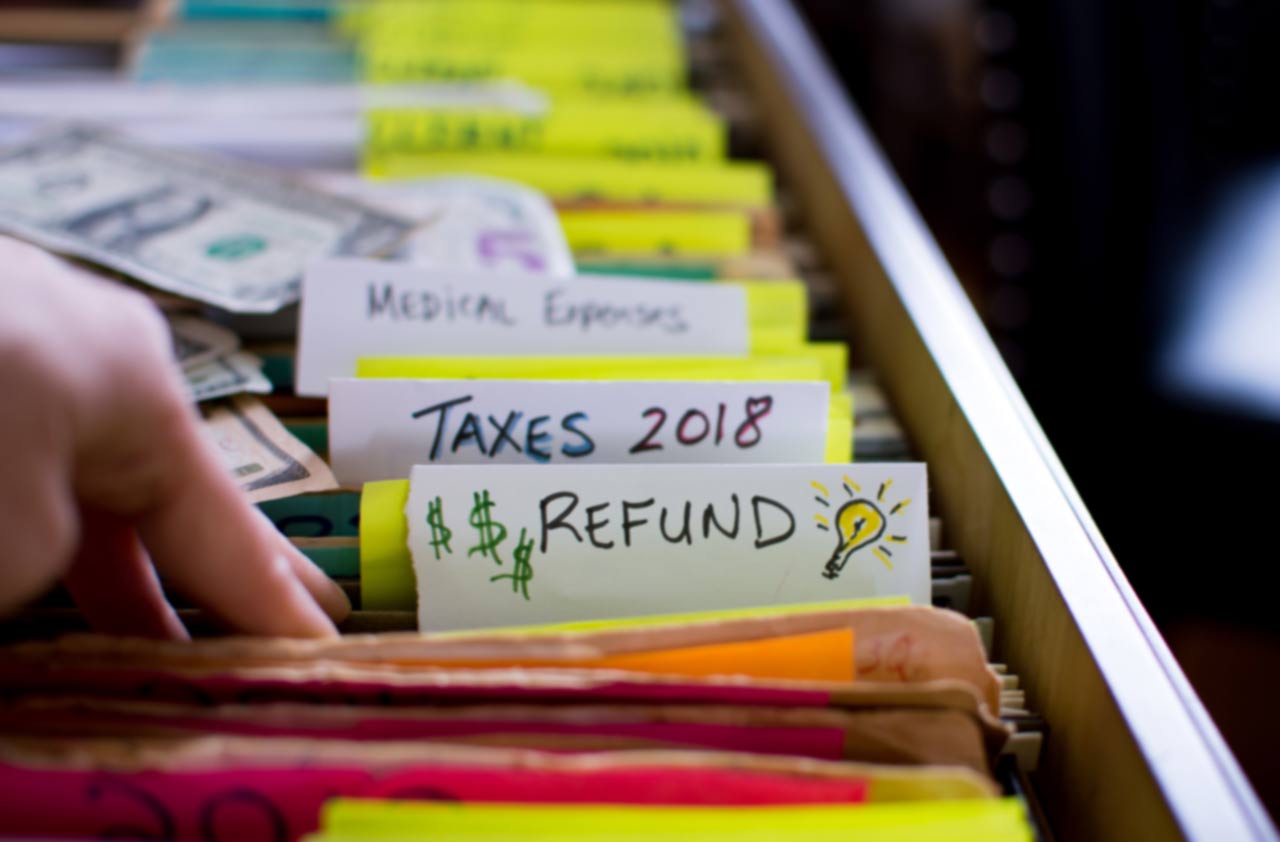4 Things You Should Know Now to Save on Taxes Later
Every money move you make (or that you fail to make) has potential tax consequences, either now or down the road. Take some actions today to put yourself in a better position for the long term.


Profit and prosper with the best of Kiplinger's advice on investing, taxes, retirement, personal finance and much more. Delivered daily. Enter your email in the box and click Sign Me Up.
You are now subscribed
Your newsletter sign-up was successful
Want to add more newsletters?

Delivered daily
Kiplinger Today
Profit and prosper with the best of Kiplinger's advice on investing, taxes, retirement, personal finance and much more delivered daily. Smart money moves start here.

Sent five days a week
Kiplinger A Step Ahead
Get practical help to make better financial decisions in your everyday life, from spending to savings on top deals.

Delivered daily
Kiplinger Closing Bell
Get today's biggest financial and investing headlines delivered to your inbox every day the U.S. stock market is open.

Sent twice a week
Kiplinger Adviser Intel
Financial pros across the country share best practices and fresh tactics to preserve and grow your wealth.

Delivered weekly
Kiplinger Tax Tips
Trim your federal and state tax bills with practical tax-planning and tax-cutting strategies.

Sent twice a week
Kiplinger Retirement Tips
Your twice-a-week guide to planning and enjoying a financially secure and richly rewarding retirement

Sent bimonthly.
Kiplinger Adviser Angle
Insights for advisers, wealth managers and other financial professionals.

Sent twice a week
Kiplinger Investing Weekly
Your twice-a-week roundup of promising stocks, funds, companies and industries you should consider, ones you should avoid, and why.

Sent weekly for six weeks
Kiplinger Invest for Retirement
Your step-by-step six-part series on how to invest for retirement, from devising a successful strategy to exactly which investments to choose.
With 2018 taxes hopefully behind you, probably the last thing you want to think about is what taxes may look like in 2019 and beyond.
I get that.
But you should be thinking about it. Right now, and every time you ponder making a change to your retirement portfolio. Because a tax-efficient financial plan — one that considers the potential savings you could get over a lifetime instead of just going year-to-year — can make all the difference in the health of your nest egg.
From just $107.88 $24.99 for Kiplinger Personal Finance
Become a smarter, better informed investor. Subscribe from just $107.88 $24.99, plus get up to 4 Special Issues

Sign up for Kiplinger’s Free Newsletters
Profit and prosper with the best of expert advice on investing, taxes, retirement, personal finance and more - straight to your e-mail.
Profit and prosper with the best of expert advice - straight to your e-mail.
Here are four things I wish people knew about managing their taxes now and in retirement.
1. We have a limited window of opportunity.
2018 was the first year we filed our taxes under the new tax law. While there are certainly some personal details that determined whether you paid more or less taxes than in the past, one change every taxpayer benefited from was the lower tax rates. As the law stands, those lower rates are set to expire Dec. 31, 2025. However, many professionals believe that depending on the results of the election in 2020, taxes may increase before 2026, and when they do increase, they will not JUST go back to where they were in 2017 but potentially much higher. Thus, for many people, the tax rates we see over the next several years may be the lowest rates we see for quite some time.
2. It’s important to stay focused on the big picture.
I’ve seen people scramble to earn an extra half to 1% return on an investment, only to lose what they gained — and more — because they weren’t paying attention to how that product, account or strategy would be taxed. A 6% rate of return that’s tax-free will net you more than an 8% rate of return that’s taxable. Over a couple of years, it’s no big deal. But over decades, that’s a lot of money you could be leaving on the table. Depending on the size of your portfolio, taxes can represent a significant expense. Combined with inflation, they can eat away at the retirement income you expect to draw.
3. It’s never too late to include some tax-free income sources in your portfolio.
- If you open a Roth IRA, the money you contribute can grow completely tax-free as long as you follow certain rules. And — unlike with traditional IRAs, which close the door to new contributions once you turn 70½ — for Roth IRAs, there are also no contribution limits based on age. So even if you’re 75 and want to keep putting money in, you can. Keep in mind there are earned income rules for Roths, however. If you are doing Roth conversions, you can do those at any age and any amount, so you are in complete control. Furthermore, there are no required minimum distributions (RMDs) at 70½. And because your withdrawals won’t count toward your annual income, you’re less likely to have to pay taxes on your Social Security benefits or a higher premium for Medicare Part B in retirement when taking distributions from a Roth IRA vs. a traditional IRA. (For more on Roth rules, see How Much Can You Contribute to a Roth IRA for 2019?)
- You could invest in municipal bonds, which provide income that’s free from federal taxes. The current drawback, of course, is that interest rates are still low. And in a rising-interest-rate environment, bonds tend to lose value. Also, although the income from your bonds won’t be taxed, it can still cause your Social Security to be taxed.
- Depending on your taxable income, your qualified dividends and long-term capital gains won’t be taxed. For the 2019 tax year, your tax rate is zero if your income threshold falls below $78,750 and you’re married filing jointly, $52,750 and filing as head of household, or $39,375 if filing as single or married filing separately.
4. It isn’t just what you invest in, it’s also how you diversify your accounts and manage your tax bracket.
you and your spouse earned pension checks, maximized your Social Security benefits and diligently contributed to your IRAs, your retirement income could be higher than you expected. If you manage your tax bracket throughout your life, you won’t get hit with a ticking tax time bomb in retirement. There are four distinct time periods to be aware of:
- When both you and your spouse are still working. These are your high-income years, so it makes sense to contribute to a tax-deferred retirement savings account (a 401(k), traditional IRA, etc.) to lower your tax bill. But you also should be looking at taxable and after-tax accounts.
- When you’re between retirement age (over 60) and age 70½. These are the years when retirees usually have the most control over their income. It may be a good time to start withdrawing from a tax-deferred account (penalty-free) and pay taxes on that money.
- When you turn 70. Get ready to lose some of that control. At 70, you’ll have to file for your Social Security benefits (if you haven’t already done so) and, ready or not, you must begin taking RMDs from your tax-deferred retirement accounts at 70½. Your income could rise again.
- When you’re widowed. A surviving spouse must file income taxes as single, which means higher tax tables and a lower standard deduction. Your income may drop, but your taxes still could go up.
The Individual tax season for 2018 is largely over, which makes this a good time to talk to your tax professional and financial adviser about what you should do to minimize your taxes in retirement. You’ll get their complete attention; hopefully they’ll have changed their mindset to be looking at the future opportunities offered by the tax reforms vs. just focusing on how to save a dollar today. By starting now, you’ll have plenty of time to make any changes you feel would improve your tax status in the future.
Kim Franke-Folstad contributed to this article.
The appearances in Kiplinger were obtained through a PR program. The columnist received assistance from a public relations firm in preparing this piece for submission to Kiplinger.com. Kiplinger was not compensated in any way.
Profit and prosper with the best of Kiplinger's advice on investing, taxes, retirement, personal finance and much more. Delivered daily. Enter your email in the box and click Sign Me Up.

Michael Neuenschwander, one of the founders and owners of Outlook Wealth Advisors, is a CPA and CERTIFIED FINANCIAL PLANNER® (CFP®) professional. His holistic, in-depth planning approach covers as many situations as possible to help create retirement strategies that address a variety of potential risks and taxes and provide sustainable income streams throughout retirement. Michael has a bachelor's degree in accounting and a master's degree in finance from Texas A&M University.
-
 Nasdaq Leads a Rocky Risk-On Rally: Stock Market Today
Nasdaq Leads a Rocky Risk-On Rally: Stock Market TodayAnother worrying bout of late-session weakness couldn't take down the main equity indexes on Wednesday.
-
 Quiz: Do You Know How to Avoid the "Medigap Trap?"
Quiz: Do You Know How to Avoid the "Medigap Trap?"Quiz Test your basic knowledge of the "Medigap Trap" in our quick quiz.
-
 5 Top Tax-Efficient Mutual Funds for Smarter Investing
5 Top Tax-Efficient Mutual Funds for Smarter InvestingMutual funds are many things, but "tax-friendly" usually isn't one of them. These are the exceptions.
-
 Social Security Break-Even Math Is Helpful, But Don't Let It Dictate When You'll File
Social Security Break-Even Math Is Helpful, But Don't Let It Dictate When You'll FileYour Social Security break-even age tells you how long you'd need to live for delaying to pay off, but shouldn't be the sole basis for deciding when to claim.
-
 I'm an Opportunity Zone Pro: This Is How to Deliver Roth-Like Tax-Free Growth (Without Contribution Limits)
I'm an Opportunity Zone Pro: This Is How to Deliver Roth-Like Tax-Free Growth (Without Contribution Limits)Investors who combine Roth IRAs, the gold standard of tax-free savings, with qualified opportunity funds could enjoy decades of tax-free growth.
-
 One of the Most Powerful Wealth-Building Moves a Woman Can Make: A Midcareer Pivot
One of the Most Powerful Wealth-Building Moves a Woman Can Make: A Midcareer PivotIf it feels like you can't sustain what you're doing for the next 20 years, it's time for an honest look at what's draining you and what energizes you.
-
 I'm a Wealth Adviser Obsessed With Mahjong: Here Are 8 Ways It Can Teach Us How to Manage Our Money
I'm a Wealth Adviser Obsessed With Mahjong: Here Are 8 Ways It Can Teach Us How to Manage Our MoneyThis increasingly popular Chinese game can teach us not only how to help manage our money but also how important it is to connect with other people.
-
 Looking for a Financial Book That Won't Put Your Young Adult to Sleep? This One Makes 'Cents'
Looking for a Financial Book That Won't Put Your Young Adult to Sleep? This One Makes 'Cents'"Wealth Your Way" by Cosmo DeStefano offers a highly accessible guide for young adults and their parents on building wealth through simple, consistent habits.
-
 Global Uncertainty Has Investors Running Scared: This Is How Advisers Can Reassure Them
Global Uncertainty Has Investors Running Scared: This Is How Advisers Can Reassure ThemHow can advisers reassure clients nervous about their plans in an increasingly complex and rapidly changing world? This conversational framework provides the key.
-
 I'm a Real Estate Investing Pro: This Is How to Use 1031 Exchanges to Scale Up Your Real Estate Empire
I'm a Real Estate Investing Pro: This Is How to Use 1031 Exchanges to Scale Up Your Real Estate EmpireSmall rental properties can be excellent investments, but you can use 1031 exchanges to transition to commercial real estate for bigger wealth-building.
-
 Should You Jump on the Roth Conversion Bandwagon? A Financial Adviser Weighs In
Should You Jump on the Roth Conversion Bandwagon? A Financial Adviser Weighs InRoth conversions are all the rage, but what works well for one household can cause financial strain for another. This is what you should consider before moving ahead.